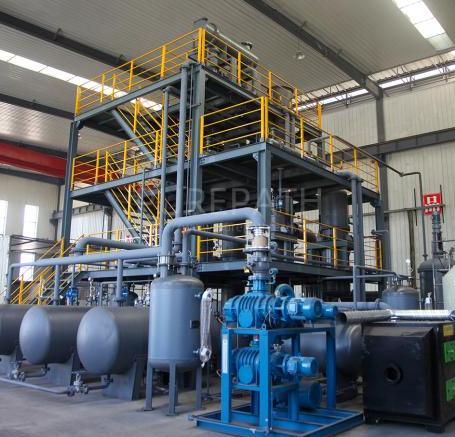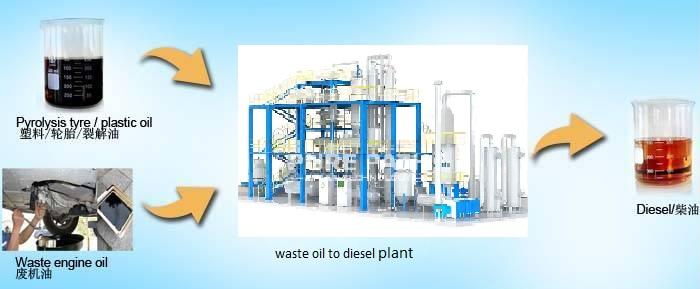Applications and Environmental Requirements of Used Oil Refining Machines
The escalating global demand for energy, coupled with the imperative for sustainable waste management, has amplified the significance of used oil recycling. Used oil, encompassing a wide array of lubricants and industrial oils, poses a substantial environmental hazard if improperly discarded. The utilization of used oil refining machines emerges as a critical solution, offering a pathway to reclaim valuable resources while mitigating ecological damage. This article delves into the diverse applications of these waste oil refining plants and the stringent environmental requirements that govern their operation.

Applications of Used Oil Refining Machines
The versatility of used oil refining machines extends across a spectrum of applications, each contributing significantly to resource recovery and environmental sustainability.
1. Waste Lubricating Oil Recycling and Reuse
Waste lubricating oil is one of the most common types of industrial waste oil. It includes:
- Used engine oil from automobiles and machinery
- Hydraulic oil from industrial and construction equipment
- Gear oil used in heavy-duty transmissions
- Compressor oil and cooling oils from industrial processes
Through refining, these waste lubricants can be converted into base oil, which is the fundamental component for producing new lubricants. The refining process removes contaminants such as water, heavy metals, and carbon residues, restoring the oil to a usable state. High-quality waste oil to base oil conversion can meet industry standards and be used for manufacturing new lubricants, reducing reliance on virgin crude oil extraction.
2. Production of Fuel Oil
Another important application of waste oil refining machines is converting waste oil into fuel oil, which can be used for:
- Industrial boilers for heating and power generation
- Diesel fuel for vehicles and heavy machinery
- Marine fuels for ships and marine engines
Depending on the refining method, waste oil can be processed into different grades of fuel. Waste oil to diesel technology allows for the production of diesel-like fuels, which can be used in trucks, generators, and construction machinery, offering a cost-effective alternative to traditional fossil fuels.
3. Other Waste Oil Processing
In addition to used lubricants, refining machines can process various other waste oils, such as:
- Pyrolysis oil from waste tires and plastics, which can be upgraded into fuel oil or diesel
- Heavy oil, ship fuel residues, and crude oil waste, which can be treated for energy recovery
- Oily sludge, a byproduct of industrial and marine operations, which can be decontaminated and processed into usable fuel
The flexibility of waste oil refining machines allows them to be widely used in industries such as petroleum refining, ship maintenance, and hazardous waste management, contributing to sustainable energy practices.

Environmental Requirements for Used Oil Refining Machines
While used oil refining machines offer numerous benefits, their operations must comply with strict environmental regulations to minimize pollution and health hazards.
1. Air Emission Control
Refining waste oil generates emissions that must be carefully managed to prevent air pollution.
Key air pollution control measures:
- Desulfurization systems: Remove sulfur compounds to reduce sulfur dioxide (SO₂) emissions.
- Denitrification (DeNOx) technologies: Reduce nitrogen oxide (NOx) emissions from combustion processes.
- Dust and particulate filters: Capture fine particulates to prevent air contamination.
- Emission monitoring: Regular inspection and compliance with air quality standards.
Strict adherence to emission limits helps prevent acid rain, respiratory diseases, and other environmental hazards associated with air pollution.
2. Wastewater Treatment
The refining process generates wastewater that must be treated to prevent contamination of soil and water bodies.
Wastewater treatment requirements:
- Oil-water separation: Ensures that residual oil does not mix with discharged water.
- Chemical and biological treatment: Neutralizes harmful substances before disposal.
- Sludge treatment: Proper handling of oily sludge to prevent soil and groundwater contamination.
Failure to properly treat wastewater can lead to severe environmental penalties and long-term ecological damage.
3. Solid Waste Management
Waste oil refining also generates solid waste, such as spent catalysts, filters, and residual sludge.
Proper disposal methods include:
- Hazardous waste classification: Identifying and categorizing solid waste for appropriate disposal.
- Safe disposal of spent catalysts: Recycling or treating catalysts used in the refining process.
- Residue processing: Using solid waste treatment techniques to minimize landfill waste.
4. Equipment and Facility Requirements
To ensure safe and environmentally friendly operations, refining facilities must comply with strict engineering and safety standards.
Key requirements include:
- Leak-proof design: Prevents oil spills and groundwater contamination.
- Fire safety systems: Installation of fire suppression systems, including extinguishers and automatic shut-off mechanisms.
- Storage and collection systems: Properly labeled and sealed containers for storing raw materials and processed oil.
5. Regulatory Compliance and Legal Requirements
Adhering to national and international environmental regulations is essential for the legal operation of waste oil refining facilities.
Regulatory considerations include:
- Environmental Impact Assessments (EIA): Evaluating potential environmental risks before setting up a refinery.
- Emission permits: Obtaining legal authorization to release gases and effluents within permissible limits.
- Compliance with national standards: For example, the Technical Specifications for Pollution Control in Waste Mineral Oil Recycling in China and similar regulations in other countries.
Consulting with local environmental authorities ensures compliance and prevents legal liabilities.

In Summary
Used oil refining machines play a vital role in sustainable waste management and resource recovery. By transforming waste oil into valuable products like base oil and diesel, these machines contribute to a circular economy and reduce environmental pollution. However, their operation must adhere to stringent environmental requirements to ensure minimal impact on the environment. The continued advancement of refining technologies and the enforcement of environmental regulations will further enhance the sustainability of used oil recycling.







